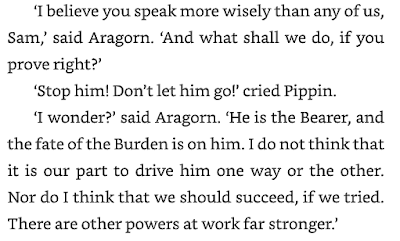So, the companions are waiting for Frodo to decide what to do. Gimli, Legolas, Merry and Pippin all think it best to go to Minas Tirith. Merry says "It would be mad and cruel to let Frodo go to Mordor. Why can't we stop him?" and Pippin concurs "We must stop him." (FotR 403) If they cannot dissuade him, they all mean to join him, but Sam recognizes that's not an option for Frodo. He must and will choose to stick with the quest and head off to Mordor, preferably alone. Aragorn concurs (id.):
Now, Frodo is surely no match for two Men, especially if backed by a Dwarf and an Elf. And yet in response to Pippin's renewed suggestion of forcible constraint, Aragorn seems almost to suggest that "other powers [...] far stronger" would thwart them from imposing their will on a single Hobbit, if he decides to press on eastward.
This is a little astonishing; we have heard much about the power of the Ring, but here it seems there are "other powers" that would support Frodo's decision, should he manage to screw up his courage to do what he must. This seems to me to follow the same hint we see in Beowulf: "Wyrd oft nereð / unfægne eorl þonne his ellen deah" (572-3). If Frodo turns aside now, fate/providence won't save him... but if he is courageous enough to continue his quest, fate may save him if he's not doomed to fail.
When Boromir returns, they realize Frodo is not merely taking a long time to decide; he has quite literally disappeared (after putting on the Ring to escape Boromir). Sam panics, and Aragorn attempts to impose order:
'Wait a moment!' cried Aragorn. 'We must divide up into pairs, and arrange – here, hold on! Wait!'
It was no good. They took no notice of him. Sam had dashed off first. Merry and Pippin had followed, and were already disappearing westward [...]. Legolas and Gimli were running. A sudden panic or madness seemed to have fallen on the Company. (FotR 404, emphasis added)
That last sentence suggests to me a divine madness, one that descends perhaps from the "other powers" to which Aragorn so recently alluded. It is especially the words "seemed to have fallen on" that convey this impression, in conjunction with its suddenness. This is no slow-boiling kettle, with people gradually working themselves up to a frenzy; the sense is of something external which has "fallen on" them.
As a result of this "panic or madness," the company is scattered, almost like the children of men in the land of Shinar when God confounds their language, that they may not understand one another's speech (Genesis 11:7 [tower of Babel]).
But this madness and scattering providentially assists Frodo's decision to continue the quest. Sam attempts to follow Aragorn, but can't keep up. Stopping to catch his breath, he finally realizes what Frodo must have done and takes off after him just in time. So Frodo gets the companion he needs, and the two are able to slip off undetected amidst the chaos until it is too late for their friends to stop them or join them.
We can't say for sure that this is a divine or providential madness at work to support Frodo's new-found resolution... but I don't think we can rule it out.
* * *
Coda: We later get Pippin's recollection of this "sudden panic or madness," as he starts to piece together where he is and what's happened.
Of course: he and Merry had run off into the woods. What had come over them? Why had they dashed off like that, taking no notice of old Strider? They had run a long way shouting – he could not remember how far or how long; and then suddenly they had crashed right into a group of Orcs: they were standing listening, and they did not appear to see Merry and Pippin until they were almost in their arms.
Again, he has the sense that something "had come over them."





